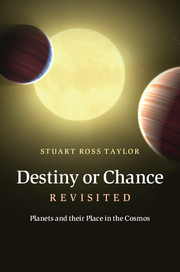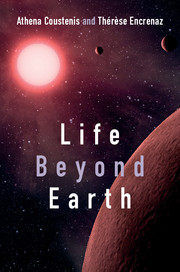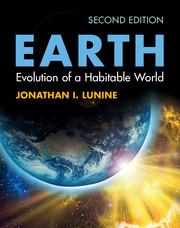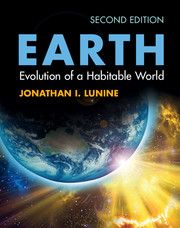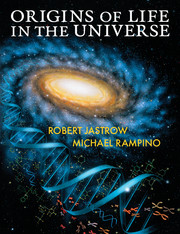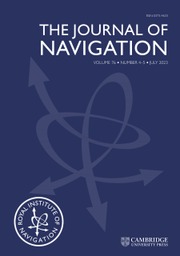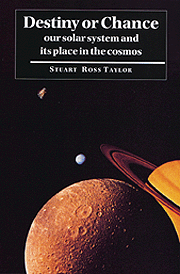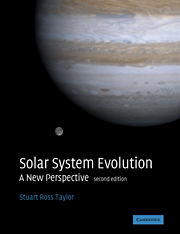Destiny or Chance Revisited
This exciting tour of our Universe explores our current knowledge of exoplanets and the search for another Earth-like planet. Beginning with the basic concepts of planet formation and the composition of the Universe, Stuart Ross Taylor summarises our knowledge of exoplanets, how they compare with our planets and why some stars have better habitable zones. Further sections provide a detailed study of our Solar System, as a basis for understanding exoplanetary systems, and a detailed study of the Earth as our only current example of a habitable planet. The book concludes with a philosophical and historical discussion of topics surrounding planets and the development of life, including why our chances of finding aliens on exoplanets is very low. This is an engaging and informative read for anyone interested in planetary formation and the exploration of our Universe.
- An engaging and accessible account which cuts through the hype on exoplanets and avoids overly technical or specialized discussion
- Highly topical and important, the book recounts how exoplanet discovery has boomed in recent years, but the search for an Earth-mass planet requires further technological development to progress accurately
- Includes an interesting discussion on the historical development and input of science and religion in the search for extraterrestrial intelligence (SETI)
Reviews & endorsements
'This book is an encyclopaedic reference of the vast range of intertwining phenomena and processes which compete to shape the paths of planet-making. It is comprehensive, thorough, and admirably up-to-date. With many intriguing historic antidotes and vivid analogies, Taylor lucidly conveys some deep concepts in layman terms, without the distraction of intimidating formula or excessive jargon. It is a must-have for all amateurs or professionals who are fascinated by our place in the Universe.' Douglas Lin, Lick Observatory, University of California
'In his highly readable style, Ross Taylor describes the most recently discovered members of the solar system family, and the planets found to circle other stars. Anyone interested in planetary formation will be interested by his argument for their formation by chance and the laws of physics, not by destiny or design, and his conclusion that other peopled earths must be extremely rare.' John Wood, former Associate Director, Harvard-Smithsonian Center for Astrophysics
'This book presents an interesting and novel view of the origin of the Earth and life upon it. It successfully covers the known fact[s] about the main members of our solar system as well as fully covering the recent discoveries concerning other planetary system[s]. It also looks the formation of planets and planetary system[s], placing the concept within the wider context of stars and galaxies. It is [a] thoroughly readable account, accessible to a wide audience, with complex concepts being explained in an informative way. Readers of all levels will both enjoy and learn from this book.' Iwan Williams, Queen Mary, University of London
'Subject: nothing less important than the universe including its history. Author: nothing less than a world-renowned scientist of broad learning with an exceptional gift for exposition. Result: nothing less than a must-read for scientists, philosophers, and anyone interested in learning about some of the most dramatic advances in our understanding of the universe and our place in it.' Michael J. Crowe, Professor Emeritus, University of Notre Dame, and author of The Extraterrestrial Life Debate, 1750–1900
'This is an engaging and informative read for anyone interested in planetary formation and the exploration of the universe.' Lunar and Planetary Information Bulletin
'… benefits from an accessible and engaging tone … full of interesting tidbits …' Olivia Johnson, skyatnightmagazine.com
'Without doubt one of the most important astronomical texts of the decade so far.' Astronomy Now
'Taylor puts the reader at ease early by defining terminology in an inviting conversational tone, which continues throughout the book … Useful for intrepid laypersons, students, and professionals. Summing up: recommended. Lower-division undergraduates and above; general audiences.' N. W. Hinman, Choice
Product details
September 2012Adobe eBook Reader
9781139558303
0 pages
0kg
12 b/w illus. 9 colour illus.
This ISBN is for an eBook version which is distributed on our behalf by a third party.
Table of Contents
- Preface
- Acknowledgements
- List of abbreviations
- 1. Prologue
- 2. The Universe
- 3. Forming planets
- 4. The exoplanets
- 5. Our Solar System
- 6. Earth and Moon
- 7. Perspectives
- Appendix A. Sources
- Appendix B. The geological time scale on the Earth
- Appendix C. The geological time scale on Mars
- Appendix D. The geological time scale on the Moon
- Index.

